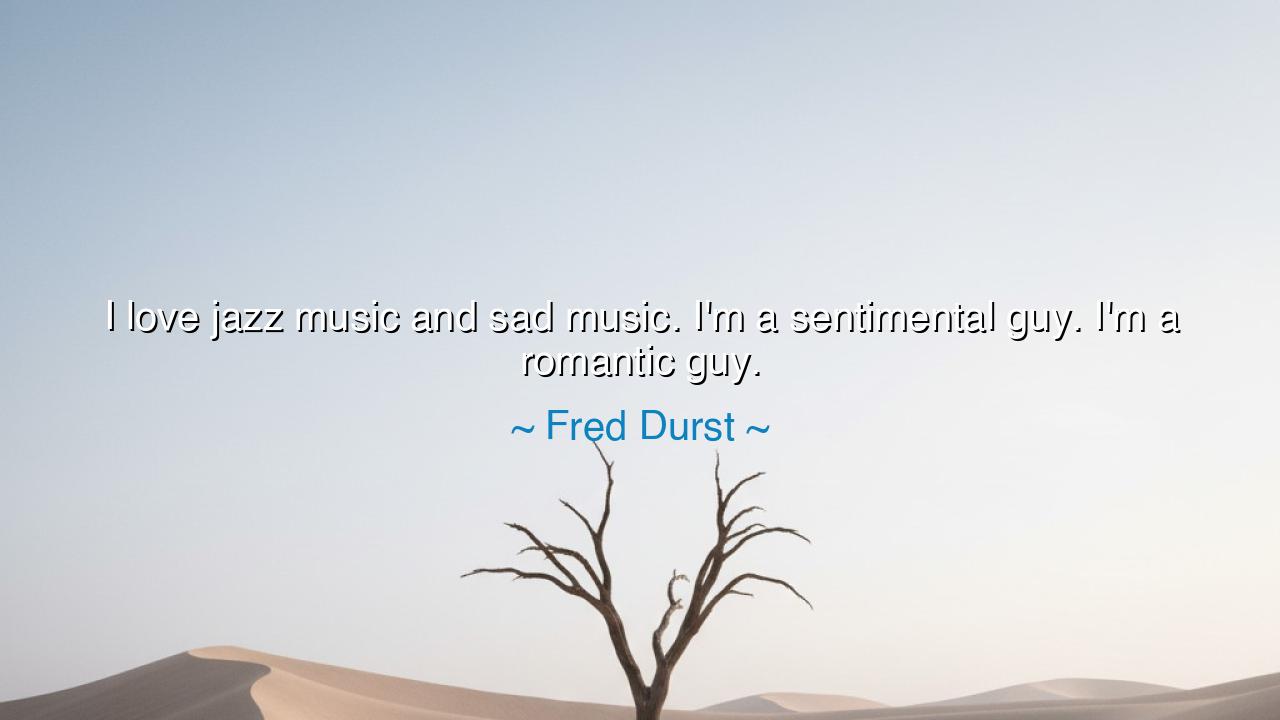
I love jazz music and sad music. I'm a sentimental guy. I'm a






When Fred Durst confessed, “I love jazz music and sad music. I'm a sentimental guy. I'm a romantic guy,” he revealed the quiet truth of a warrior’s heart — that even those who shout loudest into the void often carry within them a deep tenderness. Known to the world as the fierce voice of rebellion in the band Limp Bizkit, Durst’s words open a window into the soul behind the noise. They remind us that sentiment and strength are not opposites, but companions. The fierce man who screams against chaos also weeps in silence when touched by beauty. Thus, his words stand as a declaration that to feel deeply is not weakness, but power refined by compassion.
In the ancient world, such balance was revered. The Spartans, famed for their ferocity, sang songs before battle that spoke of love, of home, of the fragility of life. The poet Sappho of Lesbos wrote verses that captured the ache of longing — and even the stern philosophers of Athens wept at her lines. Durst’s love for jazz and sad music echoes this timeless harmony between strength and sorrow. Jazz, with its improvisation and melancholy notes, mirrors the human condition: joy laced with pain, chaos shaped into beauty. It teaches us that life is not a march, but a rhythm — unpredictable, intimate, and alive.
The confession of being a romantic guy from a man of rock and rebellion reveals something eternal: that every human soul, no matter how armored, longs for tenderness. History remembers the conquerors and the thinkers, yet it is in their love stories that their humanity shines brightest. Napoleon Bonaparte, the mighty emperor, wrote letters to Josephine filled with trembling emotion. His words were not those of a general but of a man undone by affection. Likewise, Durst’s admission reminds us that beneath every public persona lies a heart that beats to its own private melody — one that may prefer sad songs to victory marches, and quiet affection to applause.
Sentimentality, in its truest form, is the courage to remain open to beauty in a world that wounds. It is easy to hide behind cynicism, to mock love and call it foolish. But to be sentimental — to weep at a song, to ache at a memory, to love without shame — requires bravery. The ancients called this pathos, the noble capacity to feel deeply and let emotion shape wisdom. Durst’s words remind us that the heart, when unguarded, becomes a temple of truth. It is in this openness that art, music, and poetry are born.
Consider the story of Billie Holiday, whose voice carried the weight of sadness and grace. She sang of broken dreams, of injustice, of lost love — yet every note she sang turned sorrow into beauty. To love such music, as Durst does, is to recognize that suffering can be transformed into song, that heartbreak is not the end but the soil in which empathy grows. Jazz, like life, does not seek perfection; it seeks expression. And through that, it grants redemption.
In declaring himself romantic, Durst joins a lineage of those who refused to harden their souls against the tenderness of the world. The romantic spirit is not one that dwells only in love stories — it is a philosophy of seeing wonder in the ordinary, of believing in connection even after pain. To be romantic is to believe, against all odds, that beauty can be found in the ruins, that music can still rise from sorrow. It is the flame that refuses to die, even when the winds of life blow cold.
Thus, the lesson of Durst’s words is this: do not be ashamed to feel. Let your heart remain porous, your spirit receptive to melody and memory. Listen to songs that make you weep; love people who stir your soul; write words that tremble with honesty. For the sentimental heart is not fragile — it is enduring. The romantic soul is not naïve — it is eternal. And those who embrace their tenderness, as Durst did, become bridges between power and peace, between noise and silence, between the human and the divine.






AAdministratorAdministrator
Welcome, honored guests. Please leave a comment, we will respond soon